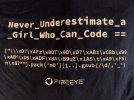CodePoet
Fractal Fanatic
Was looking for the result of this code that's on a friend's T-Shirt. Can anyone assist? I think it's Ruby code, although I'm not sure about it.
Tried pasting into some online Ruby compilers and after a bit of tweaking (removing the "[1..]"), I'm getting the below, which is repeating most of the variable name back perhaps with some encoded characters, but it seems a bit strange. I see that the pack('m0') function is supposed to encode into Base-64 I believe but decoding that is odd as well. Thanks for any help!
XMOXRDever_UncOXRDerestimatew_dENa_Girl_Who_CcOXQTn_Code
Never_Underestimate_a_Girl_Who_Can_Code == ["\\\×D7\xAFz\xBDT\x9D\×D7\xABz\xCBb\x99\xAB^\×D5\xADF\x8A\xB9uZ\x1A5\t\×A9\xF5\n\x87^"].pack('m0')[1..].gsub(/\d/,'_')Tried pasting into some online Ruby compilers and after a bit of tweaking (removing the "[1..]"), I'm getting the below, which is repeating most of the variable name back perhaps with some encoded characters, but it seems a bit strange. I see that the pack('m0') function is supposed to encode into Base-64 I believe but decoding that is odd as well. Thanks for any help!
XMOXRDever_UncOXRDerestimatew_dENa_Girl_Who_CcOXQTn_Code

